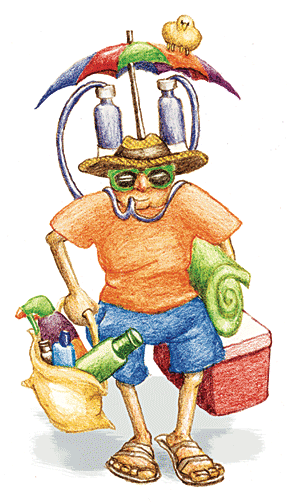

 |
 |
|
 |
Avoiding DehydrationThe summer season is upon us and it's time to think about preventing dehydration and heat-related illness. Over 300 Americans die every year of heat-related illnesses. The sad fact is that most of these deaths are preventable. Water makes up approximately 70 percent of our body and is one of its most important components. The daily functions of our body deplete our body's water levels; just in everyday breathing we exhale about two cups of water. Other ways that we lose body water is through sweating and urinating. If we fail to replenish these fluid losses, we set ourselves up to become dehydrated which can lead to the serious complications of heat exhaustion and heat stoke. People who are at increased risk for dehydration and heat-related illness include: Children: Most children spend a great deal of time in outdoor activities. They need to be encouraged to drink water regularly to stay hydrated. Athletes and Exercisers: Often have inadequate fluid
intake when compared Outdoor Workers: Those who work outside in the sun and heat often have little time for bathroom breaks or for drinking fluids, as a result these workers may not consume enough fluids during their workday. Elderly People: Heat seriously affects the elderly. It's is important for seniors to drink fluids because the older you get the less thirsty you are. Signs and Symptoms of Dehydration:
Remember that anytime a person who has been Drinking for Hydration:The best time to drink fluids is before you are thirsty, because by the time you feel thirsty, your body is already dehydrated. It's a good idea to drink on a schedule when it is hot outside. Avoid beverages containing caffeine or alcohol as they stimulate the production of urine thereby promoting dehydration. The best fluids are water or flavored sports drinks. Adults need 17 to 20 ounces of fluid before beginning activity, as well as an additional 7 to 10 ounces every 10 to 20 minutes during activity. Your body continues to require additional fluid the first two hours after outdoor activity. Children need 4 to 8 ounces of fluid before beginning outdoor activities and 5 to 9 ounces every 20 minutes while they are outside. Kids also need to consume an additional 24 ounces of fluids within the first two hours after their activities. Interesting Fact: One adult-size gulp of fluid equals one ounce of fluid, and one child-size gulp of fluid equals one-half ounce of fluid. For most of us, being aware and prepared is the easiest way to prevent dehydration from occurring. An active person can become dehydrated in just 15 minutes. If you experience any of the symptoms of dehydration listed, stop the activity and rest in a cool area. Then drink fluids to replenish the water lost. Hot Weather Tips:
For information on heat related illness and dehydration or to schedule an appointment with Dr. Gurpreet Singh »715.468.2711, Shell Lake Clinic. Dr. Singh also sees patients in Siren. |
|